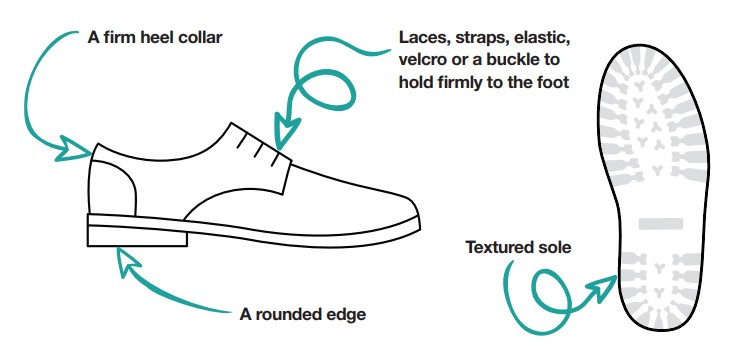Your shoes are your direct source of contact with the ground, so it is essential to wear good shoes to support your feet. Your shoes can affect your posture, stability, balance, safety and how you walk. Moving around can be more challenging if your feet are not well supported.
Between 20% and 45% of older adults experience problems with their feet. If you notice any changes or have any concerns about your feet, you should see a Podiatrist to assess your need for better footwear, treatment, or exercises.
The main functions of footwear are to support feet, protect them from extreme temperatures, moisture, hazards in the environment and injury, and support your daily activities. Footwear that does not fit well can cause discomfort, injury, and permanent foot problems. Wearing footwear that is not supportive can hurt your feet, which can alter your walking and cause you to be off balance.
What makes footwear safe?
Low heel height
Studies have shown that high heels can make you less stable and unbalanced. A safe heel should be broad and less than 2cm in height.
Mid-sole cushioning
A foam material is often used in the middle sole area of shoes to provide comfort. A good shoe will have thin and firm sole cushioning; not too much that the foot is unstable and cannot feel the ground.
Textured sole
The slip resistance of the outer sole of a shoe is essential to prevent slipping, and the amount of tread a shoe has can increase the likelihood of tripping. Too much tread can cause the shoe to grab the ground, while a smooth, slippery sole will make the shoe slip, increasing your risk of falling.
Bevelled or rounded heel
A rounded heel improves slip resistance by increasing the surface contact area of the shoe as the heel strikes the floor, which can help lessen slip-related falls.
Heel collar height
The heel collar is the back of the shoe that holds your heel. A high, firm, and supportive heel collar helps to support the foot.

Are you unsure if the shoes you have at home are safe? Use the Shoe Safety Checklist to see if you need safer shoes.
Common foot complaints
It’s normal for your feet to change as you grow older. Common foot complaints such as foot pain, toe weakness, bunions or arthritis, corns and calluses, ingrown or thick toenails, skin changes, and difficulties with foot care can lead to foot health issues and increase your risk of falling. If you have any foot complaints or notice any changes to your feet, see your doctor or Podiatrist.
Corns and calluses
Corns and calluses are a thickening of the skin that forms on the outer layer of the skin due to pressure, friction or torsion. Poor-fitting shoes often rub on any prominent areas around the toes and heels, which can cause corns and calluses.
Ingrown toenails
Ingrown toenails are when the nail grows into the toe itself, causing redness, swelling and pain. These may occur when nails are cut too close to the nail bed or when shoes push the toenails inwards.
Thick toenails
Thick toenails usually occur due to an injury to the toenail bed, such as dropping a heavy object on your toe or wearing poor-fitting shoes. Thick toenails can also result from fungal infections or naturally as the toes age from normal wear and tear.
Self-care
You can keep your feet healthy as you age through proper maintenance, care, and regular check-ups. Watch the Check Your Feet video below and learn simple tips for taking care of your feet.
Who can help you to wear safe footwear and look after your feet?
Doctors or GPs
If you have any concerns about your feet or footwear, it is best to speak to your doctor or GP at your next appointment. If you don’t have a regular doctor or GP, use Health Direct to find one near you.
Podiatrists
Podiatrists can help treat any foot problems you may have. They can also give you foot exercises and advice on safe footwear. The Australasian Podiatry Association WA can help you find a podiatrist in your local area.
Aboriginal Health Workers
Aboriginal Health Workers can help you to find services that suit your needs. They help to provide a link between Aboriginal communities and health care services. For more information visit the services below:
- Moorditj Djena – Strong Feet program
- Australian Indigenous HealthInfoNet
- Aboriginal Health Council of Western Australia
- WA Department of Health – Aboriginal Health
Diabetes WA
People with diabetes may have a higher risk of falling as diabetes can impact the nerves in your feet and reduce blood circulation. For more information about diabetes and foot health, please refer to Diabetes WA.
Making your home safer and looking after your eyesight are also important for improving your health and preventing falls. Learn how you can Make Your Home Safer and Check Your Eyesight to prevent falls.





